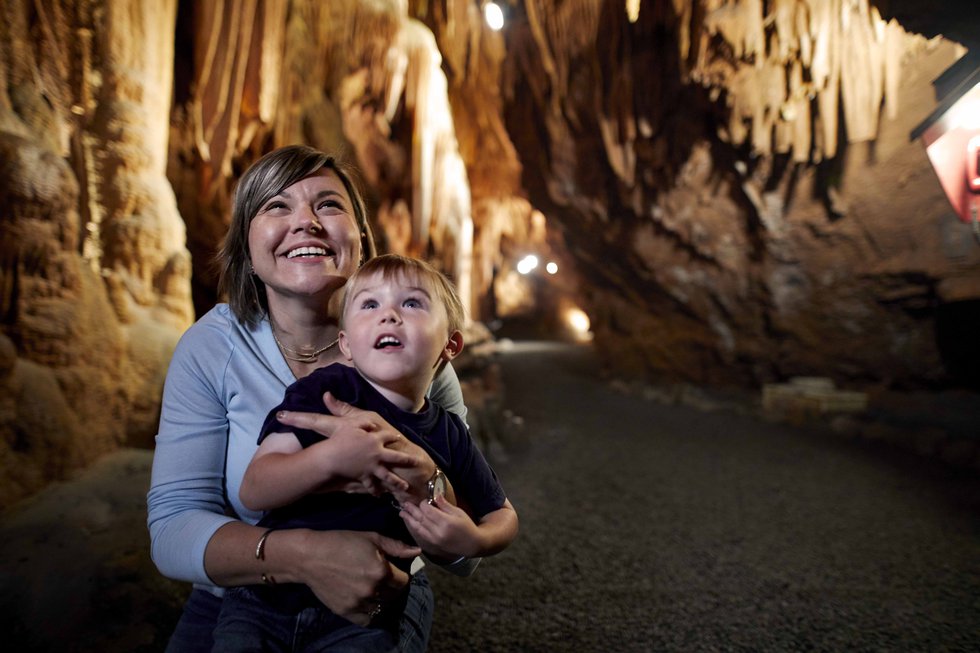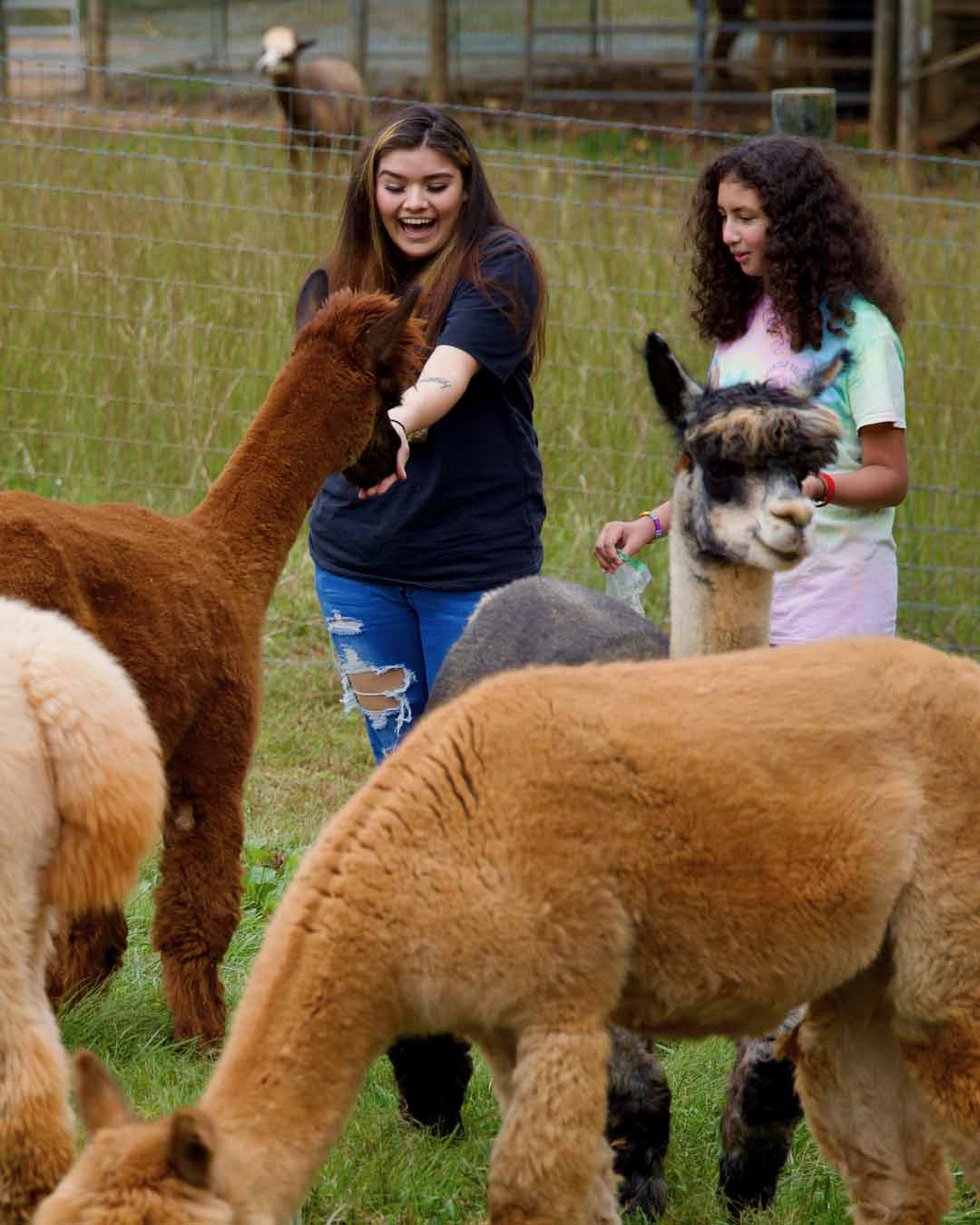
OL1020OK01_004P.TIF
Harvest Hosts brings quirky stays to Virginia.
It was a late spring evening when Maura Keaney and her 10-year-old son, Hugh, maneuvered their new camper van down the dirt road toward Sacred Acres Alpaca Farm in rural Fluvanna County.
“My expectation was that it’s going to be more of a touristy place,” recalls Hugh. But as his mother parked in the grass, they heard dogs barking as Sacred Acres owner and host Mary Jane Cathers strolled over to welcome them. “Then, she took us on an entire tour of the farm,” Hugh says. “We got to feed the alpacas, and it just felt like we were invited.”
The mother-son team was checking out their new mobile digs with a series of short camping trips. Ahead of them was a yearlong roadschooling trip to all the major national parks. They were testing the waters through a stay arranged through Harvest Hosts, an RV membership program that allows self-contained RVs to overnight at unique locations across the country.
Bill Zhang, the chief marketing officer at Harvest Hosts and a Virginia native, says that Harvest Hosts has curated specific, intentional experiences. “What we don’t want to do is copy Walmart or Waffle House or Cracker Barrel,” he explains, adding that picturesque, experiential locations are an emphasis. “We’re really focusing now on unique experiences,” he says. With more than 150 hosts in the state, quirky stays come naturally to Virginia.
Each host participant is different—some are off-the-grid rural, others are not quite so isolated. They’re mostly farms, breweries, and wineries with a few other categories snuck in. There are more than 5,100 participating Harvest Hosts throughout the country and amenities vary, like hookups, Wi-Fi, and pet policies. The main advantages are location and that there is no fee associated with the stay. RV-ers just pay a Harvest Hosts membership that starts at $99 per year.
We rounded up three Harvest Hosts to consider:
Shenandoah Caverns

SV21012603P_026.TIF
Shenandoah Caverns in Quicksburg makes an out-of-the-box Harvest Hosts destination. RV-ers can park in a gravel lot overlooking picturesque cornfields of the Shenandoah Valley and enjoy the actual caverns, a giant labyrinthine maze 200 feet below ground that stays at a constant 54°F year-round. Also onsite is the American Celebration on Parade, a 40,000-square-foot exhibit of 20 of the most famous parade floats ever created—from presidential inaugural parades to the Rose Parade. Or they can wander through Main Street of Yesteryear, where ornate window displays come to life that sparkle, sing, and dance.
At Caverns Café, visitors can order a Coke made with the original 1957 recipe, an old-fashioned milkshake, or hardy meals like fries and burgers. The café includes indoor dining and a patio outside. ShenandoahCaverns.com

P1155076.jpg
American Celebration on Parade at Shenandoah Caverns offers an up-close look at a unique collection of stunning parade floats, props, and stage settings.
Keystone Truck and Tractor Museum

Just 30 minutes south of Richmond in Colonial Heights, Keystone Antique Truck & Tractor Museum promises “a century of agricultural heritage.” But don’t let the name fool you: “We’re not just trucks or tractors,” says Anne Snead, the museum’s events coordinator. “We have sports cars, we have motorcycles, we have fire engines. We have a little bit of everything in between.” Harvest Hosts RV-ers can choose from one of 10 pull-through designated parking spots before exploring the 125,000-square-foot museum that’s chock full of every vintage vehicle you can think of, all in pristine condition. Snead says that for many folks, the antiques conjure up childhood memories. “It makes people take a walk down memory lane,” she says.
The Keystone Grill, an ode to Americana in its own right, is the museum’s mom-and-pop restaurant onsite that serves breakfast and lunch every day from 7 a.m. to 3 p.m. Diners can park themselves on stools at the counter or in old-fashioned booths. Every item on the menu is made-to-order, and plates come piled high with pancakes, grits, mouthwatering barbecue, fried chicken, fries, brisket, and more. Visitors who want to pocket a tiny green tractor or an antique fire truck to remember the moment can find them in the gift shop, where items are handpicked by staff, including diecast replicas, Virginia peanuts, and a variety of vintage signs for the souvenir collector. KeystoneTractorWorks.com
Sacred Acres Alpaca Farm

How many people can say an alpaca woke them up? RV-ers staying at Sacred Acres sure can.
In 2014, after a career in social work, Mary Jane Cathers, a lifelong crocheter and knitter, came to alpaca farming through a love of textiles. She had already experienced the magic of alpaca fiber—“it feels like silk,” she says—so when she saw a sign in a store advertising “everything you need to know to buy, sell, and raise alpacas,” she decided to try it. Ten years later, she owns a herd of 19 of these curious camelids in Palmyra.
Cathers likes it when RV-ers arrive in time to join her on evening roundups. It gives her a chance to educate them on her farm and alpacas, which have the misfortune of being confused for their larger cousins, the llama. While llamas can be friendly, they are also known for their aptitude for spitting and hissing. On the other hand, the average personality of an alpaca? “Think domestic cats,” says Cathers, only bigger. She explains that some are aloof and want only to be fed and left alone, while others are more cuddly. “I look at them sometimes, and I think I’m raising a bunch of longneck cats,” she says.
Visitors can pay for a guided tour of the farm, an on-site fiber workshop, or the chance to walk their own alpaca through woodland trails. When skies are clear, RV-ers can do a lot of stargazing with the Milky Way directly overhead. Sometimes it’s even possible to see the International Space Station crossing the sky.
In the spring, Cathers began hosting an immersive experience she calls “Be an Alpaca Farmer for a Day.”
Visitors shadow her and her team as they feed the alpacas, let them out to graze, and take care of the herd’s health. They even learn how to administer injections. “I can’t help myself,” says Cathers. “I’m a teacher.”
At the end of their first Harvest Hosts stay, Maura and Hugh Kearney left Sacred Acres with a pair of alpaca socks and a bit of inspiration. “What was memorable and I think really unique about the experience wasn’t just the view where we actually camped, it was meeting Mary Jane,” says Maura. “It was just so inspiring to meet this woman who was so enthusiastic and so friendly and so full of life having discovered this entirely new career. Hugh and I ended up talking about it the whole way home.” SacredAcresFarm.com, HarvestHosts.com
This article originally appeared in the June 2024 issue.









